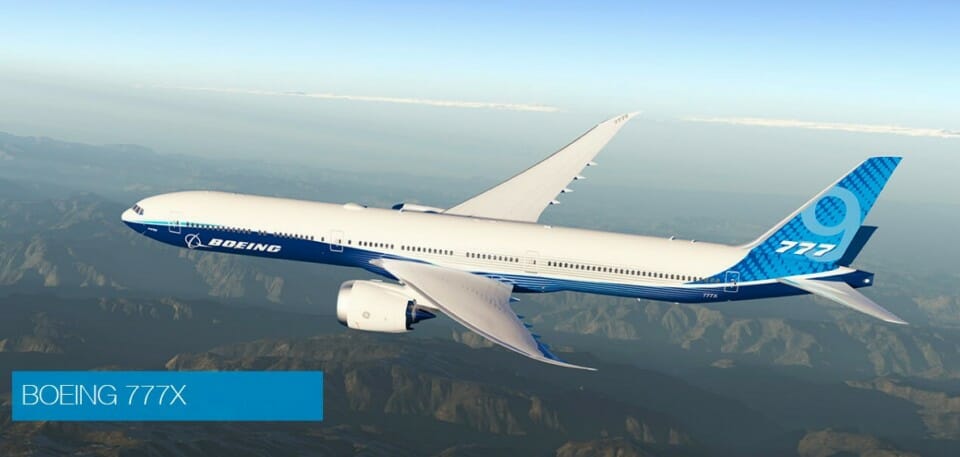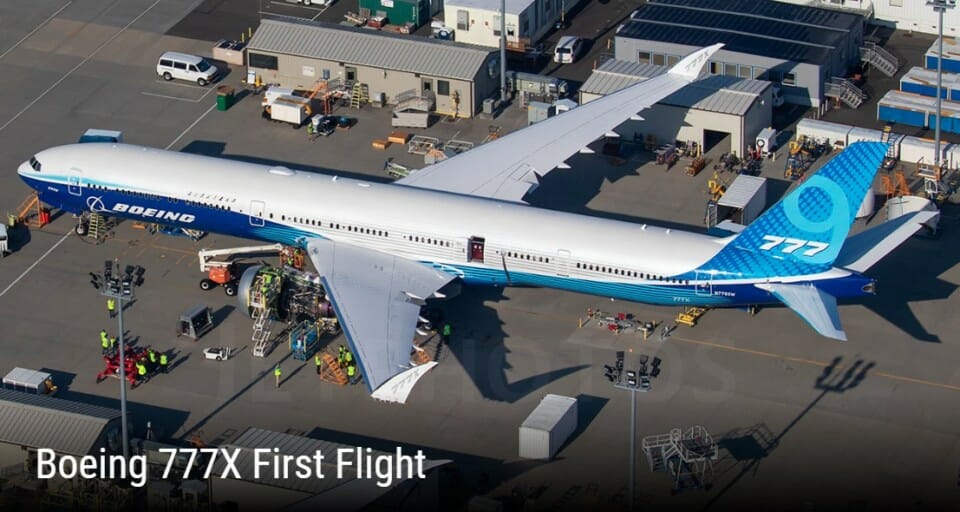Boeing is facing more developmental issuing during the certification process by the Federal Aviation Administration (FAA). The follow-on program to the 777-300ER began in 2014 and should have been in service this year. This updated 777 variant was to be designed in three models:
- 777-8 with seats for up to 384 passengers,
- 777-9 with seats for up to 426 passengers and
- 777-10 with seats for up to 450 passengers.
Aviation writer Dominic Gates of The Seattle Times identifies new issues for the FAA certification of the 777X program. The reasons for the new delays in certification are troubling news for these programs that continue to fall behind.

777 Program Development
The lifespan of airlines are determined by two driving forces:
- Functional obsolescence where the aircraft design no longer meets current performance standards and
- Economical obsolescence where the aircraft is more expensive to operate over newer models.
The 777X program was designed to replace the Very Large Aircraft (VLA) airliner segment consisting of the Boeing 747 and Airbus A380. As with the history of commercial jet transports, four-engine aircraft developed into three-engine aircraft and to the two-engine Boeing 777. This efficiency progression is due to the advancement of jet engine technology. The 777X uses the new General Electric 9X engine with a fan diameter of 132 inches making it the largest jet engine in production.
How Aircraft Development Programs Work
Aircraft are developed from one of two different design types:
- A clean-sheet design where the aircraft is developed from scratch and
- A follow-on program where an existing aircraft is typically stretched and modernized.
The original development of the Boeing 777 program in the 1990s was the result of a clean-sheet design. This method is far more costly and time-consuming due to having to perform all of the research and design processes. Coming up with a new airliner is an extremely process-intensive process that takes a long time to complete. The advantage of a follow-on program is that development time and costs are far less because the program uses an existing aircraft. In regard to the 777X as a follow-on program, the 777X development and certification should have been completed by this year which is not going to happen.
These development methods also apply to the General Electric GE9X engines. General Electric took the existing GE 90 engine that powers current 777 models and increases the power output and also reducing fuel consumption. General Electric did have some component reliability problems with the new engine which have been corrected.
Uncommanded Pitch Up
This is a situation where the nose of the aircraft points up. This problem should sound familiar. This is the same effect that caused pilots to lose control of the two Boeing 737MAX aircraft that crash resulting in a nearly two-year, worldwide ground of the aircraft type. During a test flight on December 8, 2020, the 777X test aircraft experienced an uncommanded pitch up. This is to say that the aircraft pitched up on its own without any input from the flight crew. As we saw with the 777MAX and the MCAS issues, this flight problem is totally unacceptable.
Avionics Have Become A Moving Target
The avionics in the aircraft are responsible for managing flight parameters by operating the control surfaces that turn (yaw), attitude (pitch) and banking (roll). These three basic functions are part of all aircraft whether it is a single-engine Cessna or an Airbus A380. Boeing engineers have been making continual changes to both the hardware and software of the avionics systems. It has come to a point where the multiple changes to the avionics systems have been a continually moving target. As we saw in the 737MAX program, these critical functions have to prove that they are reliable and not a work-in-process.
Not Ready For Primetime
The aircraft certification body in the United States is the Federal Aviation Administration (FAA). The FAA has already suffered a major credibility loss with the 737MAX approval debacle. The FAA sent Boeing a letter on May 13, 2021 which is a scathing rebuke of the 777X program. FAA administrator Ian Won spelled out specific areas of concern that will delay the certification process by the FAA.
The FAA warned Boeing it may have to increase the number of test flights planned and that certification realistically is now more than two years out, probably in late 2023.
The FAA cited a long litany of concerns, including a serious flight control incident during a test flight on Dec. 8, 2020, when the plane experienced an “uncommanded pitch event” — meaning the nose of the aircraft pitched abruptly up or down without input from the pilots.
“The aircraft is not yet ready,” Won wrote. “The technical data required for type certification has not reached a point where it appears the aircraft type design is mature and can be expected to meet the applicable regulations.”
An FAA official, who asked not to be identified in order to speak freely, said the drag on 777X certification is now “the subject of a lot of attention” at high levels both within the agency and at Boeing.
The FAA is telling Boeing that suspension of the 777X certification process is warranted until Boeing can prove to the FAA that the aircraft is ready to be certified as airworthy.
777X Customers Are Not Happy
The 777X can transport large numbers of passengers with a significant reduction in fuel burn. Boeing has orders for 320 777X aircraft from eight airlines. Tim Clark from Emirates has gone from being irritated to angry at Boeing. Emirates has an order for 115 aircraft and needs the 777X to replace the fuel-guzzling Airbus A380 aircraft. He has put Boeing on notice of his extreme displeasure of aircraft deliveries to Emirates and he has also told Boeing that he could refuse the 777X if the aircraft fails to meet performance commitments.
Final Thoughts
When Boeing began making jet airliners in the late 1950s, they were regarded as the gold standard in airline service. Quality and performance were key to the success of the Boeing Commercial Airplane Company. Now, Boeing keeps tripping over the performance and reliability of key follow-on programs, the 737MAX and 777X.
Has Boeing lost its way? Just looking at the modernization of two key existing aircraft programs, it would seem so.
Boeing is not going to get a free pass in certification by the FAA. They will have to perform or go back to the drawing board.
As airline passengers are concerned, they have every expectation that the aircraft they are flying on has been proven to be both safe and reliable. For the airlines, their frustration with Boeing continues to grow.



